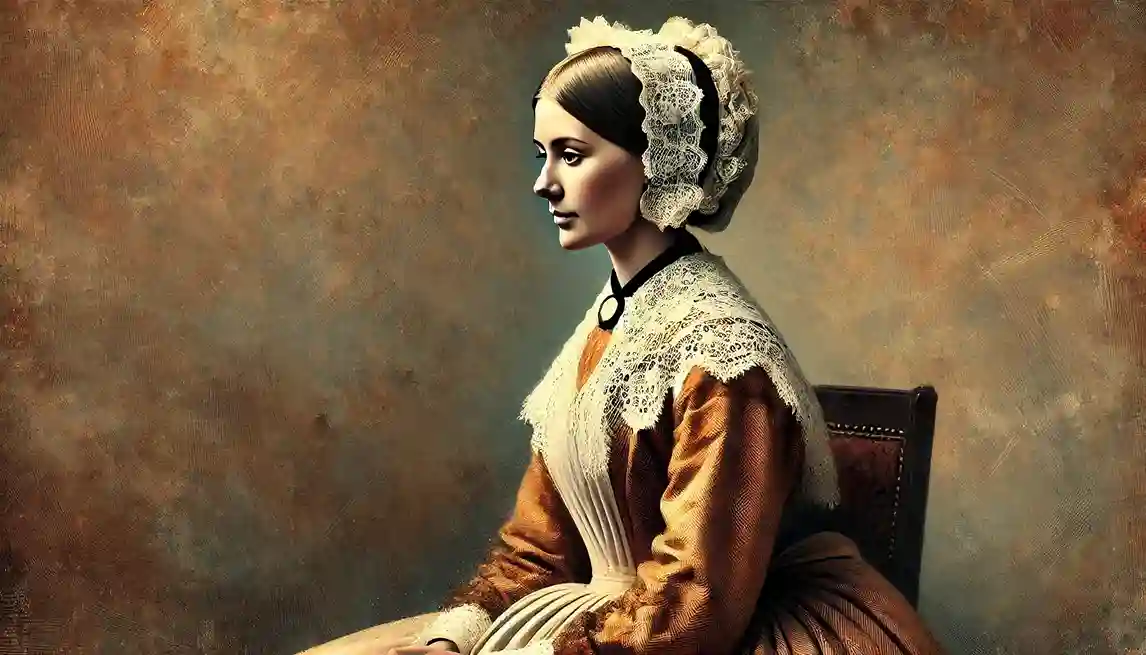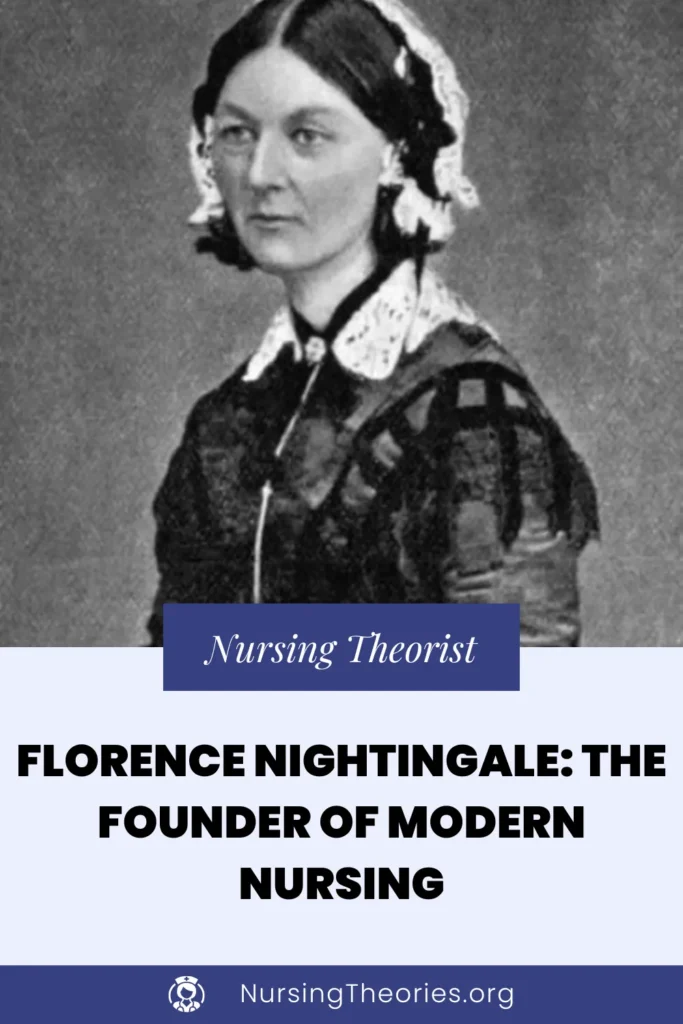Florence Nightingale, known as “The Lady with the Lamp,” is widely regarded as the founder of modern nursing, a title she earned through her transformative contributions to the profession.
Her tireless dedication during the Crimean War and her compassionate approach to patient care fundamentally reshaped how nursing was perceived and practiced.
Her groundbreaking work not only established nursing as a professional and respected field but also laid the foundation for modern healthcare practices worldwide.
As a reformer, educator, and advocate for public health, Nightingale revolutionized how hospitals operated and how patients were treated.
Her legacy, embedded in both nursing education and sanitation reform, continues to influence global healthcare systems today.
In this article, we cover Nightingale’s life, achievements, philosophy, and lasting impact on modern nursing.
Quick Summary
- Revolutionized nursing through sanitation reforms during the Crimean War.
- Founded the first professional nursing school at St. Thomas’ Hospital.
- Developed the Environmental Theory, which remains foundational to modern nursing practice.
- Overcame societal opposition and gender norms to elevate the status of nurses.
- Left a global legacy recognized through honors like International Nurses Day.

Early Life and Background of Florence Nightingale

Birth and Family Background of Florence Nightingale
- Florence Nightingale was born on May 12, 1820, in Florence, Italy, to a wealthy and prominent British family. Her parents, William and Frances Nightingale, provided her with an extensive education, which included studies in literature, history, philosophy, and mathematics—a rare privilege for women during that era.
- From a young age, Florence displayed an extraordinary sense of compassion and responsibility, often tending to the sick and injured animals on the family estate.
Cultural, Religious, and Social Influences
- Deeply influenced by her Christian faith, Nightingale believed that her calling to serve others was divinely inspired. At the age of 16, she experienced what she described as a religious “calling” to dedicate her life to nursing and public service.
- However, societal expectations at the time presented significant challenges. Women from upper-class families were expected to marry well and manage households, not work in professions considered low-status, such as nursing.
Early Aspirations to Nursing
- Despite strong opposition from her family, Florence was resolute in her decision to pursue a career in nursing. Her determination eventually led her to seek training at the Institution of Protestant Deaconesses in Kaiserswerth, Germany, where she received her first formal nursing education.
- This training, along with her observations of poor conditions in hospitals during her travels, fueled her mission to improve healthcare systems and reduce preventable deaths.
Florence Nightingale’s Philosophy and Vision
- Florence Nightingale believed that nursing was much more than simply treating illness; she saw it as a holistic discipline combining compassion, structure, and scientific principles. For her, healing was not just about medical interventions—it was about creating an environment that fostered recovery and well-being.
- She emphasized the importance of hygiene, proper ventilation, fresh air, clean water, and adequate nutrition in maintaining health. Nightingale believed that a well-structured system of care could significantly reduce preventable deaths.
- Her famous quote, “Nursing is an art: and if it is to be made an art, it requires an exclusive devotion as hard a preparation as any painter’s or sculptor’s work,” reflects her vision of nursing as a highly respected profession grounded in dedication and rigorous training.
Florence Nightingale’s Education and Early Training
Formal and Informal Education/Training of Florence Nightingale
- In 1851, Nightingale traveled to the Institution of Protestant Deaconesses in Kaiserswerth, Germany, where she received hands-on training in nursing, hospital sanitation, and patient care.
- Her studies extended beyond Kaiserswerth, as she also visited hospitals in Paris and across Europe, where she observed practices and analyzed what contributed to poor health outcomes in hospital settings.
- This period of training gave her valuable practical knowledge that later fueled her reform efforts.
Early Professional Experiences Nightingale’s Career
- Nightingale’s early professional work included voluntary nursing positions in London hospitals, where she gained firsthand experience with overcrowding and unsanitary conditions.
- Her exposure to poor patient outcomes due to hygiene-related issues solidified her belief that structural changes were needed to improve healthcare settings.
Key Achievements and Contributions of Florence Nightingale
The Crimean War: A Turning Point
- In 1854, Nightingale was appointed to lead a team of 38 nurses to care for British soldiers wounded during the Crimean War. Upon arriving at the British field hospital in Scutari (modern-day Istanbul), she found appalling conditions—overcrowded wards, dirty water, inadequate ventilation, and high mortality rates.
- Nightingale implemented strict hygiene practices, improved ventilation, and ensured access to proper nutrition and clean water. As a result, mortality rates dropped dramatically from 42% to 2% within six months.
- Her nightly rounds through the hospital, where she carried a lamp to check on soldiers, earned her the nickname “The Lady with the Lamp,” symbolizing hope and comfort to wounded soldiers.
Sanitation Reforms and Health Policies
- After the war, Nightingale returned to Britain and continued her mission to improve public health by working with government officials.
- She contributed to reforms in military hospitals, emphasizing clean water, waste management, and proper drainage. Her recommendations laid the foundation for improved healthcare infrastructure, both in Britain and globally.
The Nightingale School of Nursing
- In 1860, she established the Nightingale Training School at St. Thomas’ Hospital in London, marking the beginning of formal nursing education.
- The school provided rigorous training that combined theory with practical experience. Nightingale’s graduates spread her methods worldwide, raising the standards of nursing education and healthcare delivery.
Statistical Innovations and Data Use
- Nightingale was a pioneer in using statistics and data visualization to advocate for change. She used pie charts and graphs to demonstrate the impact of poor sanitation on mortality rates, revolutionizing how health outcomes were presented to policymakers.
- Her innovative approach to using data earned her recognition as one of the early pioneers in evidence-based medicine.
Overview of Nightingale’s Environmental Theory
- Focus on Healing Environment: Nightingale’s Environmental Theory emphasizes how a patient’s surroundings directly influence recovery.
- Key Environmental Factors: Fresh air, clean water, proper drainage, cleanliness, and adequate lighting are essential for promoting healing.
- Prevention of Infection: A clean and well-ventilated environment reduces the spread of infection and supports faster healing.
- Revolutionary Ideas: Her concepts were groundbreaking during her time and laid the foundation for modern infection control practices.
- For a deeper understanding of Florence Nightingale’s Environmental Theory, be sure to read “Florence Nightingale’s Environmental Theory: Explained with Real Examples.“
Notable Publications by Florence Nightingale
Nightingale authored several groundbreaking works, many of which are still referenced in nursing education and practice today:
- Notes on Nursing: What It Is and What It Is Not (1859)
- Considered a foundational text for modern nursing, this book provided practical advice on patient care, hygiene, and creating a therapeutic environment. Nightingale wrote it for both professional nurses and caregivers in the home, making it accessible and practical.
- Notes on Hospitals (1859)
- This publication focused on hospital design and sanitation practices. Nightingale outlined guidelines for proper ventilation, waste management, and ward layouts to reduce the risk of infection.
Challenges and Criticisms Florence Nightingale’s Work
Personal or Societal Challenges
- Nightingale faced resistance from her family and society, as nursing was seen as a low-status profession unsuitable for women of her social class. Her decision to pursue nursing defied societal expectations, but her determination allowed her to overcome these barriers.
- Later in life, she suffered from chronic illness and limited mobility, but she continued to influence public health policy through correspondence and writing.
Criticisms of Her Work
- Some critics argued that Nightingale’s strict, hierarchical approach to nursing education limited creative thinking among nurses.
- Others contended that her Environmental Theory focused too heavily on hygiene and the physical environment, sometimes overlooking psychological and emotional aspects of patient care.
Timeline of Major Milestones In Florence Nightingale’s Life
- 1820: Born in Florence, Italy.
- 1851: Received nursing training at Kaiserswerth, Germany.
- 1854: Led nursing efforts during the Crimean War.
- 1859: Published Notes on Nursing and Notes on Hospitals.
- 1860: Established the Nightingale Training School for Nurses.
- 1907: Awarded the Order of Merit, the first woman to receive this honor.
- 1910: Passed away in London.
Legacy and Lasting Impact of Florence Nightingale
Impact on Nursing Education and Practice
- Nightingale’s emphasis on hands-on clinical training and professional standards revolutionized nursing education. Her approach became a model adopted by nursing schools worldwide, ensuring that nursing evolved into a respected and scientifically grounded profession.
Global Influence
- Her principles of sanitation and hospital design influenced healthcare systems globally, improving patient outcomes and reducing mortality rates in hospitals. Nightingale’s impact can be seen in the widespread adoption of her practices in Europe, North America, and beyond.
Honors and Recognitions
- In 1912, the International Council of Nurses established International Nurses Day, celebrated annually on May 12, her birthday, in recognition of her contributions to nursing and public health.
- Monuments, memorials, and awards worldwide continue to honor her pioneering work and leadership.
Final Years and Death of Florence Nightingale
- Despite her health struggles, Nightingale continued to work on public health projects through letters and publications until her death. She focused on healthcare reforms in India and improvements to sanitation in British hospitals.
- She passed away peacefully on August 13, 1910, at the age of 90. In accordance with her wishes, her funeral was a modest affair, but her legacy remains monumental.
Key Lessons From Florence Nightingale for Modern Nursing
- Hygiene and infection control: Nightingale’s emphasis on cleanliness is still central to preventing infections in modern hospitals.
- Data-driven decision-making: Her use of statistics to advocate for health reforms established a precedent for evidence-based practice.
- Holistic patient care: She believed in treating patients as whole beings, considering both their physical and environmental needs.
- Resilience and advocacy: Nightingale’s ability to overcome societal barriers and implement lasting change demonstrates the importance of perseverance and leadership.
- Education and mentorship: Her dedication to training future nurses highlights the ongoing need for mentorship and professional development.
Conclusion
Florence Nightingale’s legacy is a testament to the power of dedication, innovation, and compassion in transforming a profession.
Her contributions to nursing education, public health, and hospital reform laid the groundwork for modern healthcare.
As nurses and healthcare professionals continue to draw on her teachings, her vision of compassionate, evidence-based care remains as relevant today as it was in her lifetime.

